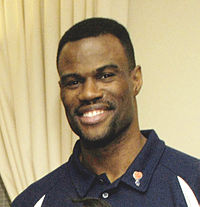 David Robinson played 14 years for the San Antonio Spurs, won a championship in his final season and rode off into the sunset as a basketball hero.
David Robinson played 14 years for the San Antonio Spurs, won a championship in his final season and rode off into the sunset as a basketball hero.
Julius Erving played all 11 of his NBA years in Philadelphia and was honored in every arena where the 76ers played as he headed into retirement.
While that may seem like the norm for star athletes, the truth is very different.
This season, one MVP announced his retirement, while several surefire Hall of Famers are nearing the end. How will their careers end? With a bang? Or a whimper?
The reality is that most professional sports careers end badly. Whether you are a superstar, a player with a full career or a journeyman, the chances are that your career will likely end by circumstances beyond your control. Most players don’t actually retire. They get canned. As a matter of fact, many players’ careers end without them even knowing it. 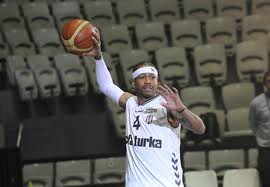
Allen Iverson just retired, three years after playing in his last NBA game. As a perennial All-Star and former MVP, he fully intended to keep playing.
But it seemed that everyone except him knew that his career had ended. He just didn’t get picked up. It took three years for him to get the message.
After 10 great seasons, he spent his golden years bouncing around from team to team before going overseas.
This year, the Boston Celtics’ second all-time leading scorer, Paul Pierce, was traded to the Brooklyn Nets with fellow veteran star Kevin Garnett. The Celtics were rebuilding, and both were sent packing. As one of the all-time Celtics greats, what does it take to retire with your original team? Folks expected that with Pierce, but it didn’t happen.
Hey, not everyone can be John Havlicek.
Tim Duncan is nearing the end of his career with the Spurs and will almost certainly play his last days with the team. Kobe Bryant is coming off a major injury on a rebuilding Lakers team, and it is not out of the realm of possibility that he finishes his career elsewhere while chasing that sixth ring. Teammate Steve Nash saw his Phoenix Suns team crash and rebuild; his last two years have been ruined by injuries and exile to the struggling Lakers.
What does it take to retire well?
There are several factors, many of which are out of a player’s control.
The biggest reason that players have little control over their retirement is that they have no residual value. As they age, they become a quickly depreciating asset. When they can’t go anymore, their value immediately plummets to zero. Very often teams have a difficult decision to make. Do they just let a player retire or try to get something of value in a trade before its too late?
What is the goodwill value that the Spurs get by having their two biggest stars, Robinson and Duncan, just retire? 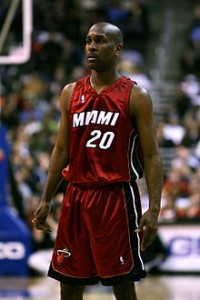 Compare that to the careers of Charles Barkley, Shaquille O’Neal, Karl Malone, and Gary Payton – all huge stars who ended their careers bouncing around in search of a championship or playing on a team that made the decision to get something for them before it was too late.
Compare that to the careers of Charles Barkley, Shaquille O’Neal, Karl Malone, and Gary Payton – all huge stars who ended their careers bouncing around in search of a championship or playing on a team that made the decision to get something for them before it was too late.
Timing also plays a big role. It is difficult to time the end of a career with a peaking team. Many players don’t want to end on a rebuilding team that wins 23 games. Teams don’t want to pay a guy $19 million to average 11 points when they should be developing a rookie in that spot while they rebuild through the draft.
During the up-and-down cycles of teams, it is a near certainty that a team will have a down period at some point during a player’s career if he lasts long enough. How many superstars are willing to struggle through a few years of that?
And for mid-level players, it is a real crapshoot. They usually play until injury or age catches up with them and the phone stops ringing. Very few announce their retirement in advance. Why should they? Nothing is more fun than playing ball for a living and you can never go back once your career is over.
So enjoy playing as long as someone offers you a contract. The journeyman players have the most uncertainty.
When I ran the Retired Players Association, I would constantly see players who wouldn’t retire until years after they played their last game. Many hope for that call even though they haven’t been on a roster for a while. Several are terrific players still in their 20’s who for some reason fell off the radar.
The constant stream of new talent needing roster spots can turn the league into a giant game of musical chairs. You need to hope that you are signed when the music stops.
And for the record, after 18 years my career ended badly.
I was with the Orlando Magic playing for the great Chuck Daly. Chuck had two years left on his contract when he retired suddenly because of back problems. I hoped to play 20 years, end my career when Chuck did and stay on with the team.
With Chuck leaving suddenly, the team went into rebuilding mode and moved everybody. I was suddenly a 40-year-old free agent. Even though I was still an effective player, it was a tough sell. I ended up getting a job as the color analyst for the Seattle SuperSonics.
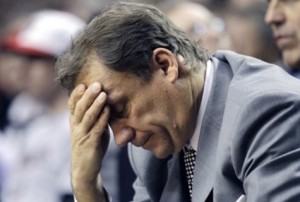 A month into the preseason, we played the Minnesota Timberwolves. Flip Saunders, their coach and GM, asked me what kind of shape I was in. Their starting center, Dean Garrett, was coming off a difficult knee surgery and they needed some insurance if he was delayed in his recovery.
A month into the preseason, we played the Minnesota Timberwolves. Flip Saunders, their coach and GM, asked me what kind of shape I was in. Their starting center, Dean Garrett, was coming off a difficult knee surgery and they needed some insurance if he was delayed in his recovery.
I told him that I was in terrific shape and we discussed what a good fit I would be for their team.
The most important thing for me was that I was not interested in being a training camp guy. I had my TV gig set for the season. If he wanted me only for a month, then it wasn’t worth me giving up this job. He assured me that as GM he had to authority to see to it that I was there for the entire season.
I came on board and had a terrific training camp. As the season started, I was asked to go on the injured list so they could evaluate Dean’s progress. That didn’t make sense to me, since the first 10 games of the season is the worst time to rush a guy back from surgery. Any setback can linger the entire season.
But I agreed and felt my hamstring tighten up. (Or was it back spasms?) Ten days later, we reached the point where the team could no longer pay my expenses and I needed to get my own apartment for the season. I was still not on the active roster, so I met with Flip and asked point blank if I was safe signing a lease. I was very specific that if things had changed, he should let me know before I get on the hook for a lease. I am a big boy and can take it.
He looked me right in the eye and let me know that things were fine. The team was on a losing run and as predicted, Dean’s knee wasn’t ready. I went and got an apartment and signed a six-month lease. The next day I was called into the assistant GM’s office.
Since Minnesota signed me for this very reason, I assumed I was being activated. Instead, I was told I was being cut. How could this be? I was told only the day before by the GM that I was in good shape.
Flip wouldn’t speak to me, so there I was S-O-L with a new apartment and in the middle of moving in my family. The kicker was that I ran into a buddy who worked for the team later that day. He said that he was told the day I was signed that I would never last past training camp.
It was all a lie from the beginning!
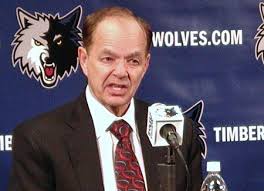 In the karma department, the team’s executives were caught signing Joe Smith to an illegal contract. Owner Glen Taylor and the team president were suspended for the entire season, and the Timberwolves had four first-round draft picks taken from them. I guess what goes around comes around. But it still sucked to have my career end being repeatedly lied to.
In the karma department, the team’s executives were caught signing Joe Smith to an illegal contract. Owner Glen Taylor and the team president were suspended for the entire season, and the Timberwolves had four first-round draft picks taken from them. I guess what goes around comes around. But it still sucked to have my career end being repeatedly lied to.
The good news was that the Sonics had not filled the TV job yet, so I was able to get that back for the next two seasons. While my story is more typical than not, I wish Tim, Kobe, Kevin, and Paul good luck as things wind down for them over the next couple of seasons. Ditto for Steve Nash.
It’s much more fun to go out with a bang and not a whimper!
Danny Schayes is a retired 18-year-veteran of the NBA, a professional broadcaster and soon-to-be-published author now penning NBA columns for SheridanHoops. Follow him on Twitter.
MORE FROM DANNY SCHAYES:
HAZING: IT’S A LOCKER ROOM, NOT AN ENCOUNTER GROUP
A STATEMENT ON “STATEMENT GAMES”
WHY PRESEASON TRIPS, NEAR AND FAR, CAN BE ONEROUS
THE NEW ANALYTICS: FOOL’S GOLD?
10 PREDICTIONS FOR THE 2013-14 SEASON
WHEN ROOKIE HAZING WENT UNDERGROUND
CAN CHRIS PAUL LEAD THE NBPA BACK FROM THE DEAD?
ADAM SILVER NEEDS TO EMBRACE THE NBA’S LIVING PIONEERS
THE FRANCHISE PLAYER IS AN ENDANGERED SPECIES
WHY THE CHAMPIONSHIP FORMULA ALWAYS WORKS (UNTIL IT DOESN’T)
HOW DO HEAT COMPARE TO GREATEST TEAMS EVER?
ON NBA COACH OF THE YEAR, AND COACHES IN GENERAL
Thanks for sharing your thoughts about audio
transcription software open source. Regards
Wonderful web site. A lot of helpful info here.
I’m sending it to some buddies ans also sharing in delicious.
And obviously, thank you to your sweat!
This is a fascinating article that read like as story, Danny. Thanks for your candor. I’m looking forward to reading your next post.